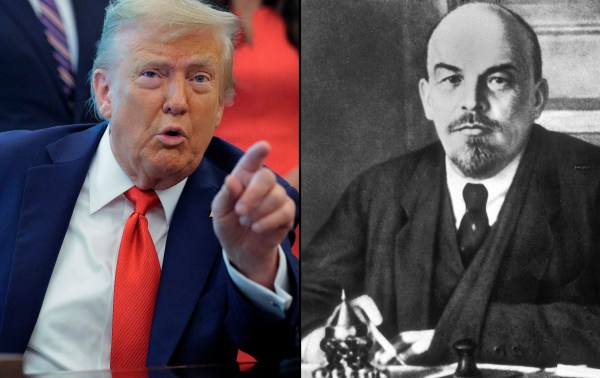The immediate aftermath of an election is a terrible time for political punditry. Everything the winner did looks brilliant, everything the loser did looks dumb, and even widely predicted results feel shocking when they actually materialize. There is no way to avoid these analytical vices, but maybe one way to minimize them is to think about what isn’t all that different or surprising about the outcome—and to trace out what the election doesn’t seem to mean. The point of such an exercise is not to minimize the importance of the election or the very real achievement of its winner. It is to reveal some of what the ecstasy and agony of the two parties could easily conspire to obscure.
Approaching this election from that angle first of all clarifies the continuity of our peculiar political era. The 2024 election was very much of a piece with our 21st-century politics: It was a relatively narrow win owed almost entirely to negative polarization.
Preliminary exit polls reveal an electorate deeply unhappy with the status quo, just as in the last several elections. Voters were not so much excited about what Donald Trump was offering as they were upset at Joe Biden (and by extension Kamala Harris) for mishandling key public challenges, and above all the economy. They have rehired a previously dismissed chief executive not because they missed him but because Republicans made the peculiar choice of renominating an unpopular (and, in the eyes of many voters, also unfit) former president who lost his bid for reelection—a choice that likely narrowed rather than broadened their victory on Tuesday. The last (and only other) time a party did such a thing was with Grover Cleveland at the end of the 19th century, and it was followed by a realigning election that enabled that party’s opponents to dominate our national politics for three decades.
Trump’s win, therefore, likely doesn’t mean that we are out of the exhausting bog of 50-50 politics in which we have been mired now for about 30 years. And it doesn’t mean that Trump’s eccentric mix of interests and priorities is well aligned with the public’s hopes and fears. This has been difficult for winning parties to grasp throughout this century. It may prove particularly challenging for the motley crew surrounding Trump, whose political instincts add up to an especially incoherent jumble—at once dovish and hawkish, libertarian and activist, traditionalist and revolutionary, authoritarian and anti-establishment.

The problem is not quite that these ideas don’t hold together but that none of them really matter to the public all that much. The exit polls suggest that family policy wasn’t high on voters’ minds in this election. Ukraine, one way or another, was not a priority either. The constituency for dispatching Robert F. Kennedy Jr. to take fluoride out of our drinking water is non-existent. People around Trump—even in the more distant reaches of his camp—are all inclined to think they’ve won a mandate for their pet cause even though voters have no idea who they are or what they want, and likely wouldn’t be on board if they did. Most of what Trump himself is most eager to do, from mass deportations to steep tariffs, would likely prove fairly unpopular when actually put into practice.
This is the trap that our 21st-century presidents have tended to fall into. They win elections because their opponents were unpopular, and then—imagining the public has endorsed their party activists’ agenda—they use the power of their office to make themselves unpopular. This is why the public moved left on key issues during Trump’s first term and right during Biden’s. Voters in this election rejected the excesses and failures of the left far more than they endorsed the right—or much of anything else.
It would therefore also be a mistake to imagine that this election victory is an endorsement of Donald Trump’s character and behavior. In the exit polls, just 43 percent of the electorate said Trump has the moral character to be president. Fifteen percent of his own voters said he didn’t. And 67 percent of voters blamed him for the violence at the Capitol after the last election.
That Trump was elected despite this widespread perception of his low character is surely an indication of one thing his victory does portend: The Trump era has lowered our expectations of the presidency. Our standards for the behavior of public officials have fallen to a degree that will exact a cost for many years to come.
Character matters immensely in the presidency, as does a proper conception of the office. And in his first term, Trump showed himself plainly to lack the character necessary for the job. He exhibited absolutely no regard for our system of government and repeatedly put that system under intense stress in the service of his implacable narcissism and bottomless self-pity. His refusal to accept the legitimacy of his election defeat in 2020 and his effort to prevent the certification of his opponent’s victory was perhaps the most serious dereliction of the presidential office in the history of our country. None of this amounts to an argument for the merits of Kamala Harris, of course. And voters made their own judgments of relative merit and harm, as they must. But there is an inescapable element of disgrace in our bringing such a person back into office after all he did. Even those who, on net, may welcome his return should not look away from that fact and must be willing to approach him critically.
This points to one more thing Trump’s victory does not mean, especially for conservatives, whatever our views of him: His victory does not mean that Trumpian populism alone will now own the right for good.
The Republican coalition is surely likely to double down on its populism in the coming few years, and so to further retrench from conservatism. Conservatives in our politics have been living with this dynamic for a decade now, and there is no easy way to adjust to it. It makes sense to try to influence the direction of policy where that is possible, and to celebrate policies we think are good for the country, of which there will surely be plenty. But it also makes sense, and is essential, to criticize bad policy, misgovernment, and bad citizenship when they arise.
Populism has always been an essential element of the coalition of the right, and it has a lot to offer in a time of elite failure and a collapse of trustworthiness. But left to itself, it tends toward a corrosive alienation from American institutions, and toward the rejection of the boundaries of republican government. Populism must be balanced by conservatism, which pushes back on both fronts and which is also utterly essential at this moment.
Conservatives cannot abandon the right—and one look at the left will easily demonstrate that we have nowhere to go in any case. But conservatives must do a better job of understanding ourselves as a distinct faction on the right, with a strong claim on its direction.
Trump’s victory does not mean that Trumpian populism alone will now own the right for good.
This has been very hard to do in the Trump era because acquiescence to his person over any political vision has implicitly become a prerequisite to participating in Republican politics. The factions of the right have behaved as if they have needed him more than he has needed them. But that is not true, and his election victory does not make it true. Relearning the habits and expectations of coalition politics is now essential.
Of course, seeing what this election does not mean should not take away from what it does mean. This win has put Trump at the peak of his power. Its achievement and reach should not be underestimated, and its implications for the future of American politics are quite significant. But a peak is followed by decline, and Trump’s win does not mean that he is the future of the right or of our politics. He will return to the White House as a 78-year-old lame duck, and he has not brought American politics out of its 21st-century deadlock. That work will have to follow in his wake.









Please note that we at The Dispatch hold ourselves, our work, and our commenters to a higher standard than other places on the internet. We welcome comments that foster genuine debate or discussion—including comments critical of us or our work—but responses that include ad hominem attacks on fellow Dispatch members or are intended to stoke fear and anger may be moderated.
With your membership, you only have the ability to comment on The Morning Dispatch articles. Consider upgrading to join the conversation everywhere.